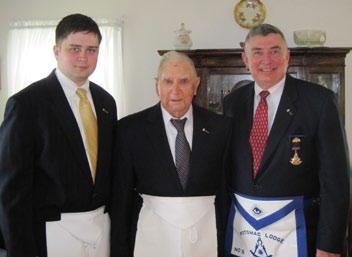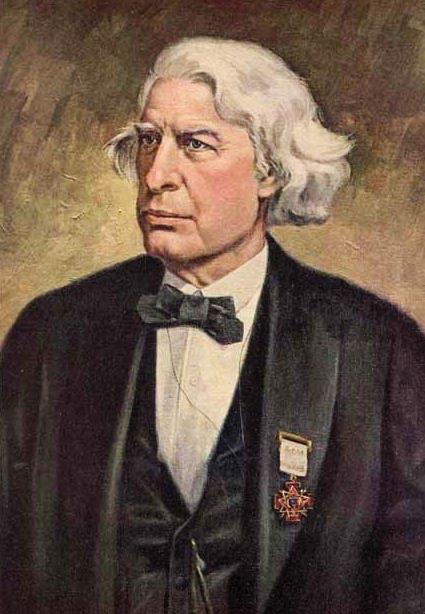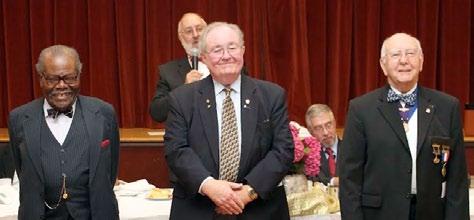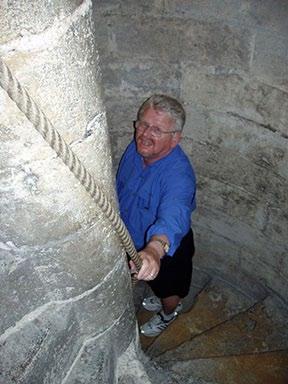
7 minute read
Naval Lodge Hosts Capitol Hill Boy Scouts
Naval Lodge Hosts
Capitol Hill Boy Scouts
Advertisement
Photograph by Katharine I. Matthews ©2012
On Sunday June 10, 2012, Naval Lodge No. 4 hosted a “Court of Honor” ceremony to honor three young men who received the Eagle Scout award, the highest award available to youth members of the Boy Scouts of America. Most Worshipful Brother Joseph S. Crociata, Grand Master of Masons of the District of Columbia presented the Masonic “Award of Merit” to Andrew Arlotto and David Shultz-Heim of Troop 500 and Joshua Godec of Troop 380. This was an historic event since it was the first time the Eagle Court of Honor was held for both Boy Scout Troops on Capitol Hill. Webster describes an eagle as a large bird of prey with sharp vision and powerful wings, famous for their strength, size, grace, and keen vision. It is the national emblem for the United States. Though the eagle is found throughout the world, it is never found in abundance; it is always rare and it is always a superb specimen.
MWB Crociata and WB Webb with the three Eagle Scouts
Troop 500’s Scout Master, Tim Penney, says, “In Scouting, the eagle stands for strength of character, and for knowledge of all phases of Scouting. The eagle represents an understanding of community and nation, and a deep respect for same.” Additionally, the eagle is a “symbol of what a young man has done as well as what that young man will do, and will be, when he grows to manhood.” In short, Penney says, “the eagle is a leader – respected both by his peers and by his adult leaders.”
Brief History of the Boy Scouts Lord Robert Baden-Powell of Great Britain started the Boy Scout movement in 1907 by working with just twenty boys. To keep track of the many useful facts he was teaching the boys he wrote notes. These developed into a book, entitled “Scouting for Boys” which was first published in 1908 as the Boy Scout Handbook. In the years that followed, approximately 150

millions of copies were sold and avidly absorbed by young boys throughout the world, and became the fourth best-selling book of the 20th century. 1 The scouting world is extensive by anyone’s standards because scouting is active in over 150 countries and is recognized by the World Bureau in 117 countries with more being recognized each year. Worshipful Brother Michael Webb, Past Master of Naval Lodge, acknowledged the history and involvement of Freemasonry with American Scouting since its establishment, when Daniel Carter Beard merged his Boy Pioneer program with Baden Powell’s Boy Scout movement and brought it to America in 1910 and became its first National Commissioner. Lord BadenPowell, who was not a Freemason, read of Beard’s program, and based on his own military experience, developed what is known as the “Boy Scouts.” Beard, who was known affectionately as “Uncle Dan” was a Master Mason from Mariner’s Lodge No. 67 in New York and worked tirelessly to create the Scouting program that exists today. Beard, who wrote and illustrated various early publications of the Boy Scouts of America, “exemplified the Masonic ideals and developed elements that are found today in the Scout badge and the Scout uniform,” Webb said. Webb also offered some insight into the use of symbolic images as lessons of moral and spiritual growth, using the “rough” and “perfect” ashlars which are found in every Masonic hall as examples. Pointing to an unrefined rectangular block of limestone, Webb says, “By the rough ashlar, we are reminded of our rude and imperfect state by nature.” On the other side, Webb points to a more polished, finished version of the same stone, “the perfect ashlar, of that state of perfection of which we hope to arrive by a virtuous education, our own endeavors, and the
1 Extrapolation for global range of other language publications, and related to the number of Scouts, make a realistic estimate of 100 to 150 million books. Details from Jeal, Tim. Baden-Powell. London: Hutchinson. ISBN 0-09-170670-X.
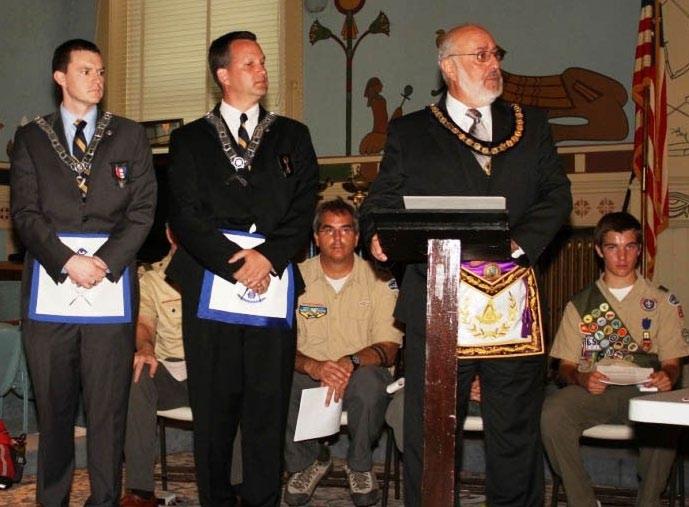

The Grand Master with members of Naval Lodge
Photograph by Katharine I. Matthews ©2012
blessings of God.” Webb encouraged the Scouts to think of themselves as “living stones” as they endeavor and advance throughout life. Most Worshipful Brother Crociata picked up on the symbolic reference and said, “perfect ashlars are not found lying about the stone quarry”, “without the benefit of their having been hammered, chiseled and polished into such a state of being.” The Grand Master described how Freemasonry builds on the principles described in The Eagle Obligation – Honor, Loyalty, Courage, Responsibility, and Service in their Commitment as Men and Masons. “Freemasons and Scouts are taught to be resourceful and to serve as positive role models and provide dedicated service to the community. “Today, more than ever before,” Crociata said, “young people need the guidance and mentoring of quality adults. In turn, these young men are better prepared to participate in and contribute as leaders in our society.”
Summary of Eagle Projects Joshua Godec’s Eagle project focused on repairing the playing fields at Tyler Elementary School, which is a local District of Columbia Public School (DCPS). As a result, the bleachers are safer and the rainwater now percolates into the ground instead of forming a large puddle in the entrance to the field. David Heim’s project concentrated on renovating the emergency food pantry at the Church of the Reformation. This food pantry is a key point of distribution for thousands of bags of food to people in need throughout the District. Andrew Arlotto’s project involved renovating and restoring library materials at Woodrow Wilson High School (DCPS). The Scout Master of Troop 380, Patrick Merkle, said “this (Naval Lodge Great Hall) is a great place to host the Court of Honor ceremony. We live in a place (Washington, DC) where history is made and we should never take for granted what a remarkable opportunity it is for our youth and for the future leaders of this community and for the nation.” Freemasonry and Scouting – A Unique Partnership Friend of Naval (FON) Brother Clayton Witt [Redemption Lodge, No. 24], and presently serving as the Assistant Scout Leader for Troop 500, described the relationship between Scouting and Freemasonry, “there is nothing in the Scout Law and Promise that cannot also be found in Masonry.” The first important thing is that each scout must make a promise to abide by certain guiding principles and subscribe to the Scout Law in the same way a Mason does in his obligation, promising to practice Masonic precepts. The scout and Mason must both believe in God and cannot be accepted in either organization if they are atheists. Like Masonry, the Scout Movement does not involve itself in any form of political activity. Reflecting on his scouting experience, Naval Brother Ed Kell, who is also an Eagle Scout from Troop 59, in Clarksboro, New Jersey, draws parallels between the mission of both organizations to develop citizens who are “physically, mentally and emotionally fit, and who have respect for the basic rights of all people”. In addition, Kell continues, “members have an opportunity to practice morality and charity and strive to make a true difference in our world.” As a Freemason and Eagle Scout, Ed proudly wore his Eagle ribbon and medal as an emblem of a Boy Scout and also participated in the administration of the Eagle oath. Speaking to an audience of more than 100 in attendance, David Heim eloquently articulated what scouting has meant to him when he said, “no other activity gives such a direct opportunity for us boys to become leaders, to become role models, to learn and to teach. No other activity says this kid is not only involved in his community but is a leader in his community. No other activity says that this kid is and will be prepared, the way that scouting does.” Heim gave examples how scouting offers the opportunity to explore and try new things… to spend a week and a half hiking in the wilderness, canoeing through the Adirondacks, or sailing through the Bahamas. Heim concluded, scouting “gives us the basic principles that will not only guide us through life, but show the incredible work that we are capable of doing in the future.” n



